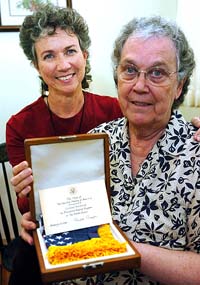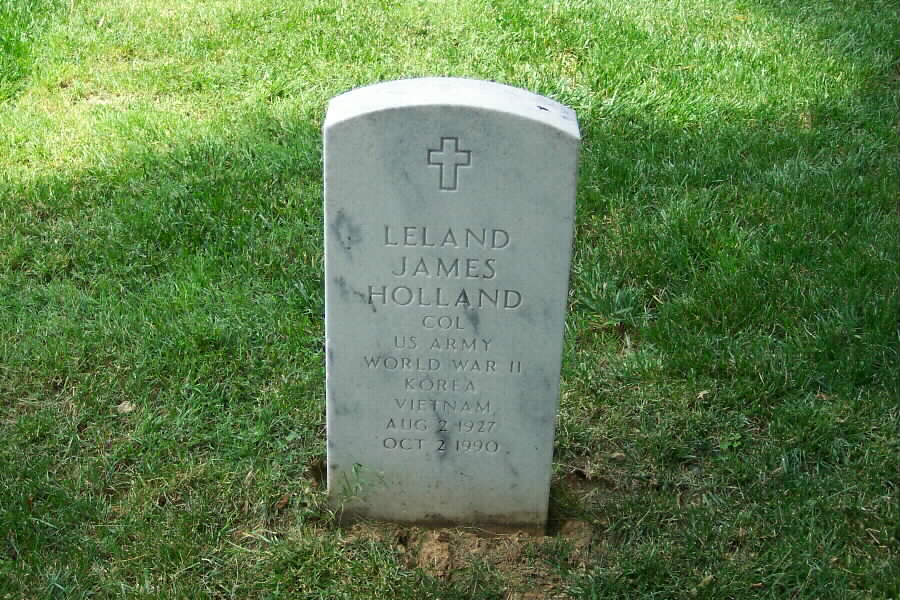Captive's family recounts ordeal
Widow of Army officer held 444 days knew her husband could tough it out; but conditions there took a toll on his health
SPRINGDALE – While her husband, Colonel Leland J. Holland, was among the 52 Americans held hostage in the U.S. Embassy in Tehran a quarter-century ago, Mary Holland kept a cartoon from the New Yorker on her refrigerator.
Mary Holland, right, displays the flag and note presented to her husband, then U.S. Army
Colonel Leland Holland, by President Ronald Reagan after he was freed from captivity in Tehran, Iran in 1981.
Mrs. Robinson Crusoe stands at the front door, watching as her bearded, bedraggled husband comes walking up.
“This better be good, Robinson,” Mrs. Crusoe says.
Mrs. Holland crossed out the “Robinson” and wrote in “Leland.”
“I believed every day he would be coming home,” said Mrs. Holland, 70, sitting at her dining table in a suburban Cincinnati retirement community, as she and Barb Holland, one of her six children, flipped through pictures of the return of American hostages to Washington, D.C., in January 1981.
Holland, a career Army officer, survived 444 days as the prisoner of Iranian radicals, despite the regular beatings, threats and seemingly endless days locked in solitary confinement.
He died of cancer at Walter Reed Army Medical Center in 1990 at age 61, nine years after his release. His wife now lives near Barb here.
Colonel Holland was sent to Tehran in 1978 to be Army attache at the U.S. embassy.
The Hollands and their youngest daughter, Rosie, lived in Iran until early 1979, when mother and daughter returned to the United States after Iranian radicals tried to take over the embassy.
“Obviously, we were all stunned when we heard the news that he was taken hostage,” Barb Holland said. “But I can honestly say that we were able to handle it a little more than a lot of the families.
“We knew Dad; we knew what he did for a living,” Barb Holland said. “And we knew what he was made of.”
Most of the hostages were civilians.
Holland – raised on a farm in Illinois – was different. He had done two tours in Vietnam – in 1966 as a military intelligence officer and a second go-around in 1972-73, in combat and deeply involved in monitoring violations of the cease-fire agreement.
His wife and their four boys and two girls were accustomed to the Colonel's long absences.
“Dad was away more than he was home when we were growing up,” said Barb Holland, who lives in Fairfield.
After she got the call from the State Department saying her husband was among the hostages, Mrs. Holland called all six of her children. “I told them all it was entirely up to them what they wanted to do, whether they wanted to say anything to the media or not.”
For the next 444 days, the Hollands kept to themselves, coming out only when they had to travel to Washington for one of the periodic briefings the Carter administration offered to hostage families.
“We banded together and supported each other,” Mrs. Holland said.
They knew, too, that their father, with his long experience as a soldier and his magnetic personality, was probably the one hostage the others looked to for guidance.
It turned out that they were right.
After Colonel Holland died, the family was stunned that every one of the surviving hostages came to his funeral.
“One by one, they would come up to me and tell me how much he had meant to them while they were imprisoned,” Barb Holland said. “They'd say that he was their teacher, the one who taught them Morse code, taught them how to pass messages from cell to cell, taught them how to cope. They loved him.”
A photograph shows Holland, a few days after the hostages' release, waiting to shake hands with President Reagan at the White House.
He looks pale, gaunt and sickly.
“We had to take him straight from the White House to the hospital,” Mrs. Holland said.
Today, Mrs. Holland bears no animosity toward the Iranian people, but she rarely talks about her husband's ordeal 25 years ago.
She and her daughter laughed when a visitor asked what Colonel Holland would think about what is happening today in Iraq.
“I think some of us in the family think he'd say we ought to be doing more in the war. Some of us think he wouldn't think much of the whole thing,” Barb Holland said.
“We all agree, though, that he'd have an opinion.”
Americans taken hostage – 25 years ago
On a Sunday morning 25 years ago, U.S. diplomats in Tehran looked out the window to see hundreds of young Iranians, fired by a love of Islam and a hatred of America, spilling over the walls and through the gate of the embassy compound.
The Americans did not know it, but they were staring at the future – a type of militant Muslim fundamentalism that would one day replace communism as the greatest threat to their nation.
That was Nov. 4, 1979, and a date on a timeline that would stretch to September 11, 2001, and beyond.
Fifty-two Americans were held captive for 444 days. Although none was seriously hurt, many were beaten, blindfolded, isolated and lined up for mock firing squads. Never had so many representatives of so powerful a nation been abused so flagrantly.
Today, 42 of the 52 hostages are alive.
Here's how Mary Holland of Springdale, and her family, were affected by her husband's ordeal.
Michael Robert Patterson was born in Arlington and is the son of a former officer of the US Army. So it was no wonder that sooner or later his interests drew him to American history and especially to American military history. Many of his articles can be found on renowned portals like the New York Times, Washingtonpost or Wikipedia.
Reviewed by: Michael Howard


